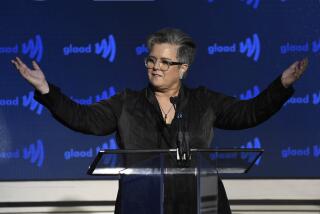And Now for Rosie’s Next Disappearing Act
- Share via
To her readers, it should have been obvious: Rosie O’Donnell--the bighearted former talk-show host and renowned “queen of nice”--was missing from the cover of Rosie, her own magazine.
Gone were the days of O’Donnell hugging Fran Drescher, goofing with Donny Osmond and posing in her hospital gown. After seemingly endless covers of O’Donnell mugging with celebs and yukking it up for the camera, she was slowly being replaced.
In September it was “The Sopranos.” In October it’s Celine Dion. Next, it will be Reba McEntire. Who knows who it will be in December, when the magazine rolls off the presses and onto the newsstands for the very last time? It certainly won’t be O’Donnell, who withdrew from her publishing agreement with Gruner & Jahr USA on Wednesday, taking her name with her.
“I cannot have my name on a magazine if I cannot be assured that it will represent my vision and my ideas,” she said in a statement to the news media.
But does anyone even care? O’Donnell has been fading from the public spotlight since May, when she gave up her daytime talk show--and her No. 1 promotional vehicle for the magazine.
Rosie boasts a readership of 3.5 million, but many of its readers are carry-overs from McCall’s--the 125-year-old magazine that morphed into Rosie to increase its ad sales and circulation. And newsstand sales have fallen sharply. When the magazine debuted in April 2001, newsstand sales averaged 550,000 copies; in 2002, some issues have sold as few as 200,000.
“If I didn’t have it, I wouldn’t really miss it,” said Allan Brooks, owner of Al’s Newsstand in Beverly Hills. Brooks, who has been in business for 30 years, said he sells almost 90% of the copies of Vanity Fair he receives each month but only 30% of Rosie, even though both have premium placement in the front row. He said interest was high when the magazine first came out but started declining around the fifth or sixth issue.
Such are the pitfalls of hitching a magazine to a star’s celebrity. Martha Stewart Living is feeling the pinch of insider trading allegations against its namesake. Even O, the Oprah Magazine, may suffer a similar fate as Rosie, when Oprah Winfrey pulls the plug on her program in 2006.
“Unless your name is Jesus Christ, nobody has been able to brand their name for eternity,” said Samir Husni, a journalism professor at the University of Mississippi who calls himself Mr. Magazine. “When your name, your picture and your message is all in there, sooner or later it’s going to backfire.”
According to Diane Salvatore, editor in chief of Ladies’ Home Journal, “Any time a new product enters the market--as Rosie did in ours--it makes everyone play harder and smarter, and that’s a good thing. But Rosie magazine was not McCall’s, and neither was it Rosie the TV show. I think they suffered from mixing their mediums.”
In the six years her show was on the air, O’Donnell won six Emmy awards for best talk-show host. She gave it up, she said, to raise her family and pursue other projects. O’Donnell, whose girlfriend is expecting the couple’s fourth child in December, has announced plans to direct a Showtime movie about a foster child coming of age and will co-produce the new Boy George musical “Taboo,” but as of Wednesday, she has one less project.
“She has walked away from her television show, her brand, her public personality, her civility--and now her fans, the advertising community, her business partner and her contractual responsibilities,” said Sue Geramian, spokeswoman for Gruner & Jahr, which also publishes Child, Family Circle and Parents magazines.
The power struggles at Rosie began over the summer when Gruner & Jahr hired Susan Toepfer, a former People magazine editor, as editor in chief. In July, O’Donnell threatened legal action but later recanted because both sides were “trying to resolve creative differences,” according to Cindi Berger, O’Donnell’s spokeswoman.
But the creative differences didn’t resolve. They worsened. O’Donnell, who said she was hired to be the “editorial director and control the editorial process,” was no longer entirely in control of its content. With Toepfer in charge, she fought (and lost) battles to put Boy George on the cover and to run a photo feature of her pregnant girlfriend.
Neither subject is quite right for a mass-appeal, general-interest women’s magazine, according to some industry experts. Nor were most of the causes O’Donnell championed as editorial director of the magazine--causes such as gun control and gay adoption.
“A woman living in the foothills of Kentucky or Tennessee is not interested in why a gay couple should or should not adopt,” said Husni. “That’s not the mass market.”
Husni predicted that neither O nor Martha Stewart Living would be around in 20 years. “Maybe O, if it doesn’t stand for Oprah. Or Martha Stewart if it’s Living magazine.”
As for the trend in namesake magazines, he said, “People will think not only twice but thrice after Rosie.”






